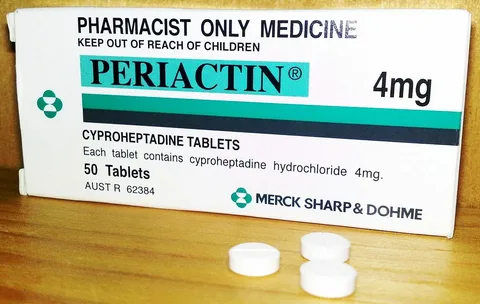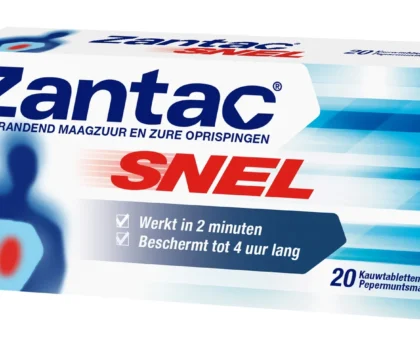Periactin, with the active ingredient Cyproheptadine, is an antihistamine primarily used to relieve symptoms of allergic reactions such as hay fever, hives, and other forms of allergic dermatitis. It works by blocking histamine, a substance in the body that causes allergic symptoms. Additionally, Periactin has a unique side effect of stimulating appetite, making it useful for patients who need to gain weight, such as those with anorexia or certain chronic illnesses. While it is effective in these areas, Periactin can also cause drowsiness, dry mouth, and other anticholinergic effects, so it is important to use this medication under medical supervision. It is typically available in tablet or syrup form and is taken one to four times daily, depending on the condition being treated and the patient’s response to the medication. Besides its primary uses, Periactin is sometimes prescribed off-label for the prevention of migraines and as part of treatment for conditions like serotonin syndrome. However, like all medications, it must be used cautiously to avoid potential side effects and interactions with other drugs.


Allergy Relief:
Periactin is widely used for its antihistamine properties to provide relief from a variety of allergic conditions, such as hay fever, hives, and other forms of allergic dermatitis. By blocking the action of histamine, Periactin effectively reduces symptoms like itching, swelling, and redness. This makes it a valuable treatment option for individuals suffering from seasonal allergies or chronic allergic reactions. Its ability to provide fast and effective relief from uncomfortable and sometimes debilitating allergic symptoms is one of the main reasons it is prescribed.

Appetite Stimulation:
Periactin is also commonly prescribed for its appetite-stimulating properties. This makes it an essential medication for individuals who need to gain weight, whether due to a medical condition, recovery from surgery, or eating disorders like anorexia. Cyproheptadine increases appetite by antagonizing serotonin receptors, which in turn leads to an increase in food intake. This effect can be particularly beneficial for children and adults who are underweight or have difficulty maintaining a healthy weight due to various medical conditions.

Migraine Prevention:
Although not its primary use, Periactin is sometimes prescribed off-label to help prevent migraines. The mechanism by which it prevents migraines is related to its serotonin-blocking effects, which can help reduce the frequency and severity of migraine headaches. For patients who suffer from frequent migraines and do not respond well to other treatments, Periactin can offer a valuable alternative. Its dual role in both managing allergic conditions and potentially reducing migraine occurrence adds to its versatility as a medication.
Periactin – Product Description
Overview:
Periactin (Cyproheptadine) is an antihistamine with multiple therapeutic uses, including the treatment of allergic reactions and the stimulation of appetite. It is particularly effective in managing symptoms of allergic rhinitis (hay fever), hives, and other allergic conditions by blocking histamine receptors in the body. Histamine is a chemical that is released during allergic reactions and is responsible for causing symptoms such as itching, swelling, and redness. By inhibiting histamine, Periactin alleviates these symptoms, providing relief to individuals suffering from allergies. In addition to its antihistamine effects, Periactin has an appetite-stimulating property, making it useful for individuals who need to gain weight. This effect is particularly beneficial for patients with eating disorders like anorexia, as well as those recovering from illnesses or surgeries that have led to weight loss. Periactin works by blocking serotonin receptors, which in turn increases appetite and food intake. This unique side effect has made Periactin a popular choice for doctors seeking to help patients who struggle with maintaining a healthy weight.
Indications:
Periactin is indicated for the relief of symptoms associated with allergic conditions such as allergic rhinitis (hay fever), chronic urticaria (hives), and other forms of allergic dermatitis. It is also used off-label as an appetite stimulant in patients who need to gain weight and as a preventive treatment for migraines.
How to Use:
Periactin is typically administered orally in the form of tablets or syrup. The dosage varies depending on the condition being treated, the patient’s age, and their response to the medication. For allergic conditions, the typical dosage is 4 mg taken two to four times daily. For appetite stimulation, the dosage may be adjusted based on the patient’s needs and response. It is important to follow the prescribing doctor’s instructions precisely to avoid potential side effects. Common side effects include drowsiness, dry mouth, dizziness, and increased appetite, so patients should be monitored regularly during treatment.
Advantages:
One of the main advantages of Periactin is its dual function as both an antihistamine and an appetite stimulant. This makes it a versatile medication that can be used to treat a range of conditions. Its effectiveness in relieving allergic symptoms is well-established, providing fast and sustained relief from discomfort. Additionally, its ability to stimulate appetite offers significant benefits for individuals who need to gain weight, making it a valuable tool in managing underweight patients. Its off-label use in migraine prevention further extends its utility, offering an alternative treatment option for patients who do not respond to conventional migraine therapies.
Conclusion:
Periactin (Cyproheptadine) is a versatile antihistamine that offers effective relief from allergic reactions and serves as a useful appetite stimulant for patients who need to gain weight. Its ability to manage multiple conditions, including off-label use for migraine prevention, makes it a valuable medication in clinical practice. However, due to its sedative effects and potential for other side effects, it should be used under the guidance of a healthcare provider. Periactin’s wide range of applications and its effectiveness in improving the quality of life for patients with allergic conditions and appetite issues underscore its importance in medical treatment.
Note:
Patients taking Periactin should avoid activities that require alertness, such as driving, until they know how the medication affects them. It is also important to inform the healthcare provider of any other medications being taken to avoid potential drug interactions.
Periactin: Effective Allergy Relief and Appetite Stimulation
In this informative video, we explore Periactin.
Why us?

Authenticity Guaranteed:
We ensure that every batch of Capoten is sourced from trusted manufacturers, providing you with genuine medication that meets the highest quality standards.

Competitive Pricing:
Our pricing is designed to make essential medications like Capoten accessible to all, offering competitive rates and frequent discounts to help you manage your health affordably.


